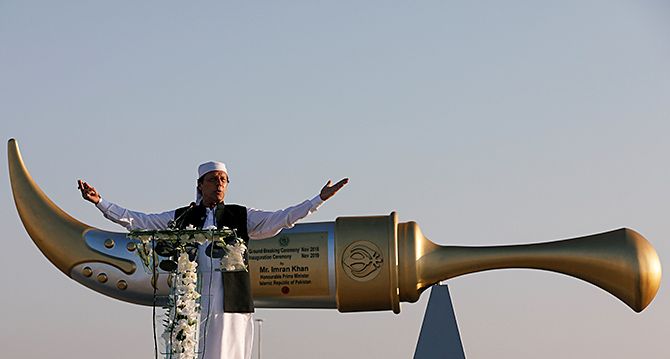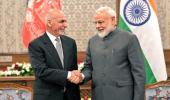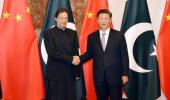'Who put the fear of god into Imran Khan and how it happened we do not know, but the great cricketer panicked and called Mahathir to regret that he cannot attend the KL Summit,' notes Ambassador M K Bhadrakumar.

The KL Summit 2019 hosted by Prime Minister Mahathir Mohamad in the Malaysian capital Kuala Lumpur on December 18-21 was originally conceived as a landmark event in the politics of the Muslim world.
It still is, albeit on a wet wicket struggling to tackle a nasty googly that Pakistan Prime Minister Imran Khan threw at the event at the last minute.
To recap, the idea of the KL Summit was born out of a trilateral pow-vow between Turkish President Recep Erdogan, Mahathir and Imran in September on the sidelines of the UN general assembly session in New York.
The common perception of the three countries was that the Muslim world failed to react forcefully enough to the emergent situation affecting Kashmiri Muslims.
Pakistan actively promoted the perception that the leadership of the ummah was not reacting forcefully enough over Muslim issues such as Kashmir.
On November 23, while announcing his decision to host the KL Summit, Mahathir said the new platform hoped to bring together Islamic leaders, scholars and clerics who would propose solutions to the many problems facing the world's 1.7 billion Muslims.
He disclosed that dignitaries attending the KL Summit would include Erdogan, Qatari Emir Sheikh Tamim bin Hamad al-Thani and Imran.
The role of politics in development, food security, preserving national identity, and redistributing wealth were listed as other topics to be discussed, alongside the expulsion of Muslims from their homelands and the categorisation of Islam as the 'religion of terrorism'.
In poignant remarks, Mahathir bemoaned that no Muslim country was fully developed, and that some Islamic nations were 'failed States'.
He asked, 'Why is there this problem? There must be a reason behind this. We can only know the reason if we get the thinkers, the scholars, and the leaders to give their observations and viewpoints.'
'Perhaps we can take that first step... to help Muslims recover their past glories, or at least to help them avoid the kind of humiliation and oppression that we see around the world today.'
Importantly, Mahathir described the summit as a meeting of minds that had the 'same perception of Islam and the problems faced by the Muslims'.
From among the list of invitees, it now turns out that Iranian President Hassan Rouhani will be attending the summit, but King Salman of Saudi Arabia has regretted that the Organisation of Islamic Conference is being bypassed.
Mahathir disclosed (external link) that King Salman conveyed to him in a phone conversation that it was better that Muslim issues were discussed in a full-fledged OIC meeting.
Mahathir said laconically, 'He (King Salman) wanted to tell me the reasons why he couldn't make it. He's afraid that something not good will happen to the Muslims. He has a different opinion from us. He feels that matters like these (Muslim issues) shouldn't just be discussed by two or three countries, and there should be an OIC meeting and I agreed with him.'
The testy exchange signalled that the Saudi regime sees the KL Summit as a calculated challenge to its leadership of the ummah and as an initiative about laying the foundations for an Islamic alliance.
Mahathir is outspoken, but what is less noticed is that his positions actually align closely with those of Turkey and Pakistan.
These include the Palestinian question, the situation in Jammu and Kashmir and the persecution of the Rohingya community in Myanmar.
According to the Malaysian news agency Bernama, the KL Summit 'aims to revive Islamic civilisation, deliberate (over) and find new and workable solutions for problems afflicting the Muslim world, contribute (to) the improvement of the state of affairs among Muslims and Muslim nations, and form a global network between Islamic leaders, intellectuals, scholars, and thinkers.'
In sheer brain power, Saudi Arabia cannot match such an agenda.
A sense of frustration has been building up over the past decade or so among the Muslim countries that the OIC is reduced to an appendage of Saudi foreign policies.
Saudi Arabia's rift with Qatar, its rivalries with Iran, the brutal war in Yemen, the killing of Jamal Khashoggi, etc also seriously dented Riyadh's image in most recent years.
Of course, Saudis hold a big purse and that still translates as influence, but the new Islamic forum is poised to move in a direction that is progressive and far more inspiring, with plans to pursue joint projects, including, eventually, the introduction of a common currency.
Mahathir is on record that this mini-Islamic conference could turn into a much grander initiative down the road.
Such optimism cannot be disregarded since a growing number of Muslim-majority countries harbour great unease over the near-term prospect of the ascendancy of Crown Prince Mohammed bin Salman as the Saudi king and the next Custodian of the Two Holy Mosques.
Saudi Arabia, anticipating the gambit being thrown down by Mahathir, has reacted viciously to undercut the KL Summit.
It tore into the summit's 'soft underbelly' by reading the riot act to Imran Khan.
Who put the fear of god into Imran Khan and how it happened we do not know, but the great cricketer panicked and has since called Mahathir to regret that he cannot attend (external link) the KL Summit.
No doubt, it is a big insult to Mahathir's personal prestige, but as the old adage says, beggars cannot be choosers and Imran Khan is left with no choice but to obey the Saudi diktat like a vassal.
With Imran Khan staying away, Mahathir is left to host his counterparts from Turkey, Iran, Qatar and Indonesia.
The fizz has gone out of the KL Summit.
Nonetheless, Mahathir is not the type of person to forget and forgive.
His initial reaction (external link) to Imran Khan's cowardly behaviour shows studied indifference, betraying his sense of hurt.
Pakistan is ultimately the loser here, as its credibility has been seriously dented.
Imran Khan was the original promoter of the idea of the three-way axis of Turkey-Pakistan-Malaysia.
But to be fair, his modest agenda was to create an exclusive India-baiting regional forum that he can use at will, whereas Mahathir turned it into an unprecedented Islamic forum that is independent of Saudi influence.
Perhaps, Mahathir can only blame himself for the overreach.
Ambassador M K Bhadrakumar served the Indian Foreign Service officer for more than 29 years. He has served as India's ambassador to Turkey and Uzbekistan and has been a contributor to Rediff.com for well over a decade.










